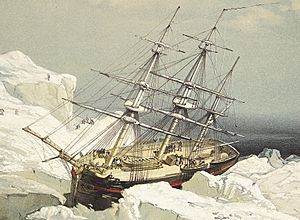Alexander Armstrong (Royal Navy officer) facts for kids
Sir Alexander Armstrong (born around 1818 – died 4 July 1899) was an Irish naval surgeon, explorer, and writer. He joined the Royal Navy after becoming a doctor. He sailed on HMS Investigator to search for the lost expedition of Sir John Franklin.
His ship, the Investigator, got stuck in ice in Mercy Bay in 1851. Armstrong spent several cold winters in the Arctic before returning home. He wrote a book about his journey called Personal narrative of the discovery of the north-west passage. This book won a special award for the best journal kept by a Royal Navy surgeon. He also wrote another book about staying healthy at sea and preventing scurvy. Armstrong continued his career in the Royal Navy, becoming the director-general of its medical department. He was knighted in 1871.
Contents
Early Life and Education
Alexander Armstrong was born around 1818 in County Donegal, which is in Ireland. He studied medicine in Dublin and at the University of Edinburgh. He earned his medical degree with high honors from Edinburgh.
Arctic Adventure and Exploration
In 1842, Armstrong joined the Royal Navy as an assistant surgeon. He traveled all over the world, visiting places like the Mediterranean Sea, islands in the Pacific, North and South America, and the West Indies. He became a full surgeon in 1849.
In 1850, Armstrong sailed from London on HMS Investigator. He was the ship's surgeon and also studied nature. His ship was part of the McClure Arctic expedition, which was trying to find Franklin's lost expedition. The Investigator successfully mapped out the Northwest Passage.
However, the ship became trapped by thick ice at Mercy Bay in 1851. The crew spent two long winters stuck there. During this time, Armstrong collected fossils from Banks Island and Victoria Island.
Armstrong and his crew were finally rescued by HMS Resolute in 1853. Armstrong could not bring his collection of animals and plants with him. But he did manage to save his important journals and a piece of petrified wood. The crew had to spend another winter in the Arctic before they could return to England. On this journey, he also collected seven brachiopod specimens from Beechey Island.
Writing About His Journeys
In 1857, Armstrong published his journals from the HMS Investigator expedition. The book was called Personal narrative of the discovery of the north-west passage. This book shared his experiences and feelings during the difficult journey. It won the Gilbert Blane gold medal, a special award for the best journal kept by a Royal Navy surgeon.
In 1858, he published another book: Observations on naval hygiene and scurvy, more particularly as the latter appeared during a polar voyage. This book was based on his time trapped in the Arctic. It explained how the crew tried to prevent scurvy and how they treated it when people got sick.
Later Life and Achievements
After his Arctic adventures, Armstrong continued to serve in the Royal Navy. He was in the Baltic Sea during the Crimean War and took part in the Battle of Suomenlinna. He was promoted to deputy-inspector general in 1858.
He then became the superintendent of naval hospitals in places like Malta, Haslar, and Chatham. In 1869, he reached a very important position: director-general of the Royal Navy's medical department.
Armstrong was knighted into the Order of the Bath in 1871. He also received several other medals, including the Arctic Medal and the Baltic Medal. He retired from the Navy in 1880.
In 1894, Armstrong married Charlotte Hall. He passed away on 4 July 1899 at his home in Sutton Bonington, England.
Legacy
A type of tree, Croton armstrongli, was named after Armstrong. He had collected a sample of this tree during an expedition to Port Essington. Later, in the 1980s, scientists looked for this tree in the same area but could not find it. It is possible that the location where the sample was collected was not recorded correctly.
|
 | Leon Lynch |
 | Milton P. Webster |
 | Ferdinand Smith |


